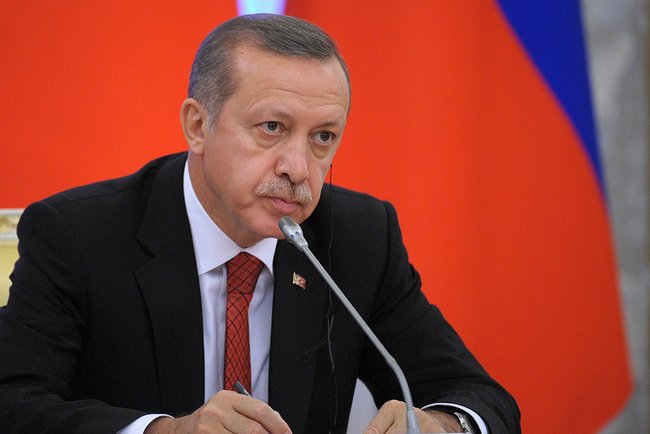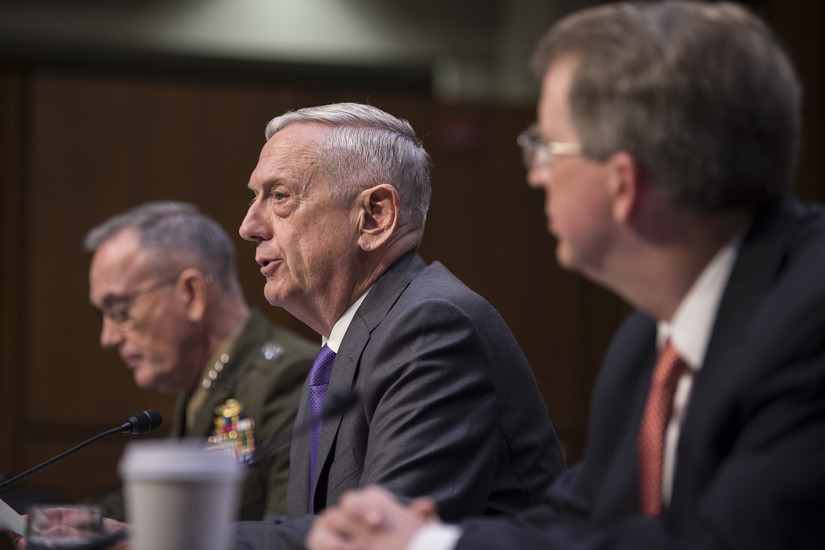Defence
Will 2017 Be the Year the US Goes to War With Syria?
Given the likely possibility that Hillary Clinton could become the next President of the United States, it is crucial to understand the implications of such an outcome. While Clinton and Obama share parallel views on many core issues, largely due to the fact that both are from the same political party, the most prolific change in policy that we would see from a Clinton presidency would in foreign policy.
Characterized as hawkish, Hillary Clinton’s perspective of the world is the antithesis of what is President Barack Obama’s viewpoint. Envisioning a world in which the United States takes the back seat in world affairs, so to speak, Obama’s presidency has set a legacy of complacency and dovish policy decisions.
One of the biggest blunders of Obama’s foreign policy legacy was his refusal to act on Syria’s President Bashar Al-Assad’s crossing of his “red line.” Early in the Syrian Civil War, Obama had kept a relatively low footprint in Syria, refusing to be entangled in the conflict for fear of the consequences that could take hold. This pragmatic way of decision making is certainly commendable, weighing the benefits versus the costs. One cannot fault President Obama for coming to the conclusion that it is within the best interests of the United States to attempt to play a more conciliatory role in the war rather than an aggressive one.
However, when threats are cast out, it is equally as important in global affairs to act on them or risk a loss of legitimacy. From a realistic point of view, countries are exploitative in nature. So when a Country A repeatedly threatens to attack Country B if certain conditions are met, but in the end Country A does nothing, would it not be logical to assume that Country B would view this bluff as a sign of weakness and indecisiveness? Would this behavior not be expected in the future should another threat be imposed by Country A?
This is precisely what occurred when President Bashar Al-Assad used chemical weapons against his own citizens in the year 2013. Expecting a harsh reaction from the United States, Assad was instead met with an empty threat. The United States regressed on its threat and in the eyes of many of the United States allies, the perception of the United States as a nation that does not stand by idly in the event of crises ceased to exist.
Even recently, a large contingent of State Department officials have wholly disagreed with the policies set in place by the Obama administration calling for direct military intervention against Syria. Hilary Clinton spared no fury in her assessment of Obama’s foreign policy, calling it a “Don’t do stupid stuff” approach to the world.
Clinton has always been regarded as hawkish in foreign policy all the way back to the Iraq War in 2003, voting in favor of intervention. So it would be no surprise to many that this behavior would follow her in the event of a presidency.
Though it is far fetched at best, one potential candidate for Secretary of Defense for the Hillary cabinet is a woman named Michele Flourney. She has, in the past, called for “limited military coercion” to remove President Bashar Al-Assad from power by instituting a no-fly zone in the country as well as sending a larger force of troops to Syria in order to remove ISIS from the country.
Hillary herself has supported such actions before, calling for a no-fly zone over Syria. Obama, as it has shown, would never contemplate such an idea, considering it to be dangerous to the United State’s image.
While the United States has supplied rebel groups in Syria, the effect of these groups is minuscule to the effect of a direct engagement with the Syrian military. Even more so, most of the groups supported by the United States are limited to fighting the Islamic State rather than the Syrian military.
In terms of foreign policy, Hillary Clinton is the converse of Obama. Being the realist that she is, she is a strong proponent of utilizing American military power to advance its interests, viewing the alternative choice as categorically weak. Obama, on the other hand, seems to think that doing nothing is better than something.
Featured Image via Wikipedia
Defence
Finland will close all but the northernmost border crossing with Russia.
To stop the flow of asylum seekers into the Nordic country, Finland will block all but the northernmost crossing point on its border with Russia starting at midnight on Friday, Prime Minister Petteri Orpo said on Wednesday.
More than 600 individuals who arrived in Finland through Russia without proper travel credentials for the European Union since the beginning of the month prompted Helsinki to close several crossings and accuse Moscow of facilitating the flow of migrants into the country. The Kremlin refutes the accusation.
Orpo stated during a news conference, “The government has decided to close more border stations today.”
According to immigration authorities, the asylum applicants are from a variety of countries, including Yemen, Afghanistan, Kenya, Morocco, Pakistan, Somalia, and Syria.
According to a spokeswoman, in response to a request from Helsinki, the European Union border agency Frontex intends to send personnel and equipment as early as next week.
EU migration commissioner Ylva Johansson said on Tuesday Finland has sought for 60 Frontex personnel on top of 10 currently stationed along its 1,340-kilometre boundary with Russia.
Following 75 migrants’ attempts to enter from Russia since last week, the majority of them were from Somalia and Syria, Estonia earlier on Wednesday accused Russia of being involved in “a hybrid attack operation” to send refugees to its border.
The Baltic nation said that it was ready to deal with migrants who attempted to enter beyond authorized crossings and to restrict border crossings if Russian pressure to control migration increased.
On Wednesday, the Finnish border guard reported that illegal immigration was still occurring at Russian border crossing locations and had advanced northward to the frontier stations of Vartius and Salla, which were still accepting asylum requests.
Finland claimed that despite a consensus that those two crossing points were only accessible by car, Russia permitted refugees to pass them on foot.
“There are growing signs that the situation is worsening on the eastern border,” Orpo stated.
Except for the Raja-Jooseppi crossing in the Arctic, Finland will close three of the remaining border crossing locations on Friday at midnight. The closure of all other border points for Finns wishing to enter Russia will continue until December 23.
“Raja-Jooseppi is the northernmost (border crossing) and it requires a real effort to get there,” Orpo stated.
He said that to avoid closing the border entirely, the administration will work to change the laws.
President Sauli Niinisto declared on Monday that it was now difficult to repatriate those who do not fit the requirements for asylum and demanded an EU-wide solution to halt unauthorized immigration into the passport-free Schengen area of Europe.
On Monday, the Kremlin said that it had officially protested Finland’s decision to close part of its border, claiming that the move was anti-Russian.
Poland, Lithuania, and Latvia accused Belarus, a strong ally of Moscow, of deliberately inciting a migrant crisis at their borders in 2021 by flying in individuals from the Middle East and Africa and trying to force them across the border. Belarus has refuted these accusations on several occasions.
Defence
Russia push for UN Security Council action on Israel, Gaza fails
Monday’s vote on a U.N. Security Council resolution sponsored by Russia that demanded a humanitarian truce in the conflict between Israel and Palestinian terrorists Hamas in Gaza was postponed until Tuesday.
Five people voted in favor of the resolution, four against it, and six others abstained. For a resolution to be approved, it must have at least nine votes in favor and not face vetoes from the five permanent members (the United States, Russia, China, France, and the United Kingdom).
“Today, the entire world waited with bated breath for the Security Council to take steps in order to put an end to the bloodletting, but the delegations of the Western countries have basically stomped on those expectations,” Russia’s U.N. ambassador, Vassily Nebenzia, said to the council after the vote.
On Friday, Russia put out a one-page draft language that included demands for hostage release, access to humanitarian aid, and the safe evacuation of vulnerable populations. The document denounced all forms of terrorism and brutality against civilians but omitted mentioning Hamas, responsible for the 1,300 deaths in Israel on October 7.
“By neglecting to denounce Hamas, Russia is protecting a terrorist organization that brutally assaults defenseless individuals. It is revolting. Linda Thomas-Greenfield, the United States ambassador to the U.N., called it “hypocritical and indefensible.”
She stated that while the United States typically abstains from council action in favor of its friend Israel, “we do agree that this council should take action, but we have to get it right and we’ll work intensely with all members on the council to do so,”
To allow the council more time to compromise, the vote on the opposing Brazilian-drafted resolution, which denounces “the heinous terrorist attacks by Hamas,” was postponed until late Tuesday.
Amid U.S. Secretary of State Antony Blinken’s exhausting meeting with Israeli Prime Minister Benjamin Netanyahu in Tel Aviv, the council convened.
In the bloodiest attack on civilians in Israel’s 75-year history, Hamas fighters attacked Israeli cities, murdered 1,300 people, and took hostages. As a result, Israel has promised to destroy Hamas, which governs the Gaza Strip.
Israel is putting Gaza under complete isolation and preparing a ground attack while launching the most severe aerial bombardment ever. According to the Gazan authorities, at least 2,750 Palestinians have died.
AFRICA
President’s “Non-Starter” Deal Will Not End Shutdown
This week, shutdown polls showed the American public blame President Trump for the government shutdown. To divert Americans’ attention elsewhere, President Trump tried to make a deal with Democrats on Saturday. Among other elements, the deal consists of three years’ legislative relief to DACA recipients and a three-year extension of temporary protected status for 300,000 immigrants whose protected status is about to expire. In exchange for these provisions, $5.7 billion border wall funding will finally be paid for. The so-called deal is a non-starter because it contains the wall House Speaker Pelosi refuses to compromise on. Moreover, Democrats seek to reopen government before beginning negotiations on border security. Democrats are presenting a united front and refusing to budge on the wall together, at least until the government is opened.
To Pelosi, the wall is an expensive and unnecessary item border security can do perfectly fine without. To President Trump, the wall is an integral part of his campaign promise and essential to seal off the border, stopping illegal crooks and helping border security officials do their jobs.
Support for the wall is clearly divided along partisan lines. Many Republican lawmakers, including Senate Majority Leader Mitch McConnell, supported President Trump’s latest proposal. McConnell said he will floor Trump’s proposal in the Senate next week. Sen. Mitt Romney is also in favor of the proposal. House Republicans too considered Trump’s deal to be bipartisan, fair, and reasonable.
Speaker Pelosi said any one item in the deal was not likely to pass the House, let alone the compilation of all items. Moreover, Trump’s proposal does not offer a permanent solution to Dreamers and TPS recipients. Dreamers and TPS recipients had their protections initially removed by President Trump. President Trump’s deal with the Democrats can hardly be called a deal at all considering the Democrats were not consulted before Trump’s announcement and none of their policy demands were met. His proposal is a consolidation of items Democrats previously voted for and band-aid solutions to Democratic immigration priorities.
Other Democrats such as Sen. Tim Kaine and Mark Werner, both of whom represent Virginia where many federal workers reside, were displeased President Trump did not address the sufferings of federal workers going without pay. Without their paychecks, federal workers, who tend to be paid less overall, can barely make ends meet with mortgage and child care payments. There is increasing dependence on food banks. The government shutdown enters its 29th day.
Featured image via Flickr/The White House
-

 Geopolitics & Foreign Policy2 months ago
Geopolitics & Foreign Policy2 months agoTurkey’s Erdogan says he may visit Egypt soon, discuss Gaza patients -media.
-

 Europe3 months ago
Europe3 months agoRussia’s Shoigu accuses the West of seeking to expand the Ukraine war to the Asia-Pacific.
-

 Geopolitics & Foreign Policy2 months ago
Geopolitics & Foreign Policy2 months agoCeasefire takes hold in Gaza ahead of hostage release; aid enters enclave.
-

 Geopolitics & Foreign Policy2 months ago
Geopolitics & Foreign Policy2 months agoRussia deploys new nuclear missile in Kaluga region – RIA
-

 America4 months ago
America4 months agoRepublican US House to hold first Biden impeachment inquiry hearing
-

 Geopolitics & Foreign Policy2 months ago
Geopolitics & Foreign Policy2 months agoChina’s military: US Navy ship ‘illegally’ entered territorial waters
-

 Europe3 months ago
Europe3 months agoZelenskiy, at NATO HQ, asks for weapons to face winter of ‘terror’
-

 Agriculture4 months ago
Agriculture4 months agoIAEA, Japan agree on continuous safety review of Fukushima water












